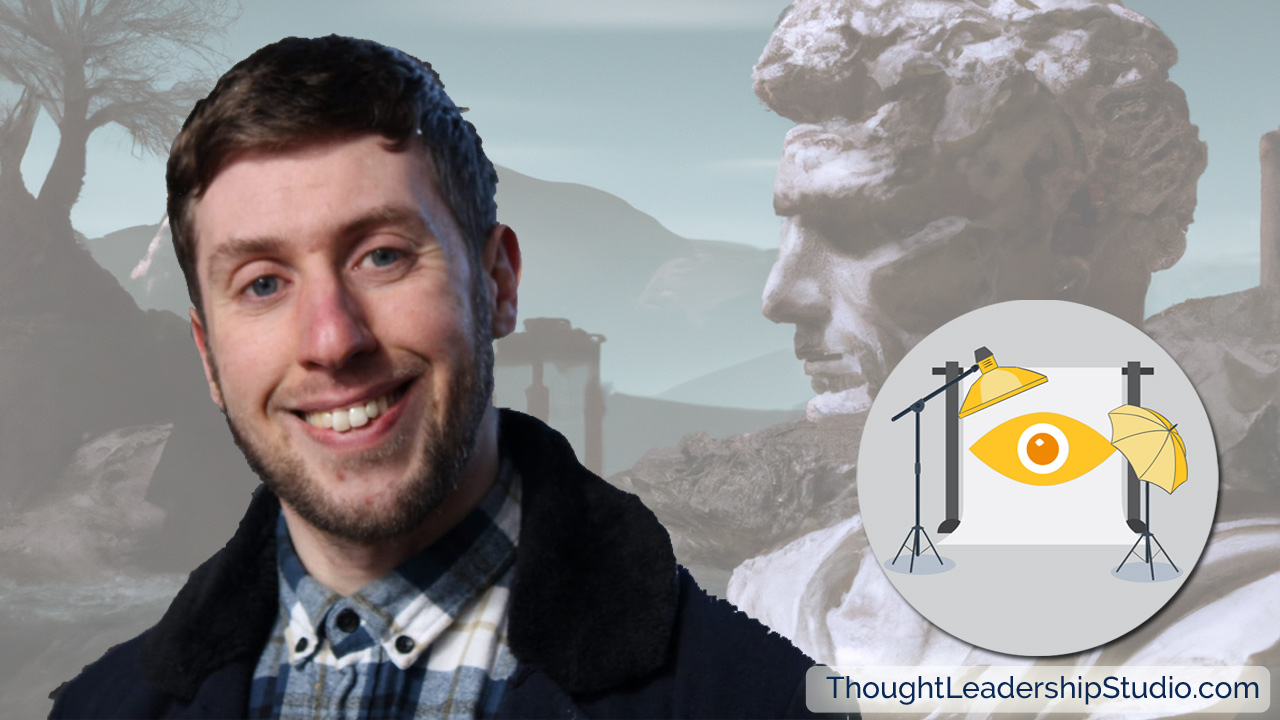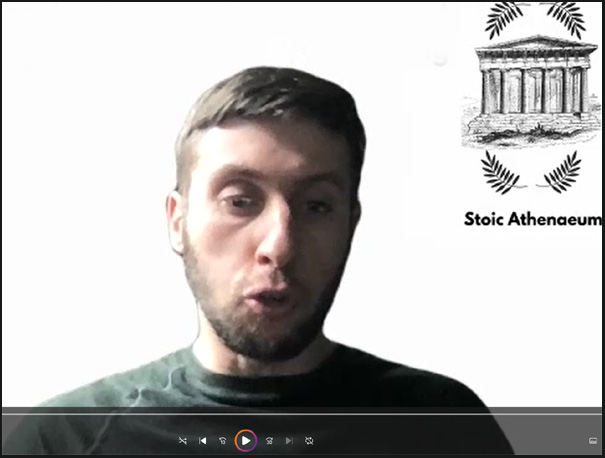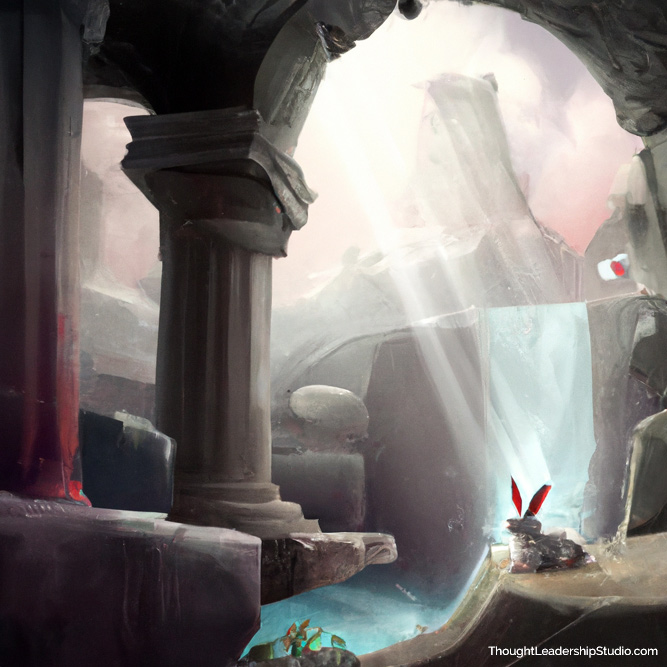Thought Leadership Studio Podcast Episodes:
Interview with Jamie Ryder - Stoicism in Marketing and Leadership
Episode 48 - Where Philosophy Meets Storytelling, Creating Narratives that Resonate and Inspire.

#authors, #contentmarketing, #contentwriting, #creativity, #insight, #inspiration, #interviews, #marketing, #marketing, #mentaltraining, #philosophy, #stoicism, #thoughtexperiments
Or Click here to listen or subscribe on appWhat this episode will do for you
:- Explore how the tenets and principles of Stoicism and other ancient philosophies can be applied in marketing and leadership.
- Expand your thinking with thought experiments drawn from Stoicism like "Contemplating the Sage" and "The View from Above".
- Explore author and content writer Jamie Ryder's fascinating journey—where philosophy meets storytelling, creating narratives that resonate and inspire.
- Discover how ancient philosophies can be a path to self-mastery that integrates with thought leadership and marketing success.
Jamie Ryder.
In this episode, we're excited to introduce Jamie Ryder, a Manchester, UK-based copywriter with a philosophical twist.
Amid the early days of the pandemic, Jamie embarked on a journey that intertwined his love for pondering questions and crafting impactful stories. This fusion led him to a unique insight: copywriting and philosophy share a powerful synergy.
Founder of Stoic Athenaeum, Jamie bridges the gap between philosophy and relatable communication. His expertise extends to various sectors—mental health, hospitality, self-development, eCommerce—transforming businesses into captivating storytellers through website content, brand voice, blogs, and content strategies.
Beyond copy, Jamie's a fiction writer, delving into horror and fantasy. He's also a beverage enthusiast, contributing to Yamato Magazine and Drink To That.
Some of Jamie's coordinates & recommended books:
Curated Transcript of Interview with Jamie Ryder
The following partial transcript is lightly edited for clarity - the full interview is on audio. Click here to listen.
Chris McNeil: I'm Chris McNeil, with Thought Leadership Studio, and copywriting is a lot like philosophy. It involves pondering a lot of head scratching questions, pulling answers from obscure places, sharing stories that make an impact, and generally pushing yourself to be better.
And that is the revelation Jamie Ryder, our guest today, had during the early days of the COVID Pandemic, when he was looking for something to recalibrate his path. Fast forward to consuming a bunch of podcasts, books and articles, and he's dug a hole two deep to climb out of. (And I'm reading straight from his about page here). Jamie's a Manchester based copywriter who uses philosophy to help businesses share their philosophy with the world. He was inspired to set up Stoic Athenaeum through his interest in Stoicism and other ancient schools of thought, and I would certainly fall in the category of "stoicism-curious".
I have seen a lot about it and am fascinated ancient philosophy in general. I think there's a lot of timeless principles we can learn from the ancients, certainly, and Jamie's on a mission to make philosophy sexier, at least down to earth and make timeless ideas new again. So welcome Jamie. It's great to have you here.
 Jamie Ryder: Well, thank you for inviting me, Chris. I'm really excited to dive into a bit of philosophy and to see where that rabbit hole takes us today.
Jamie Ryder: Well, thank you for inviting me, Chris. I'm really excited to dive into a bit of philosophy and to see where that rabbit hole takes us today.
Chris McNeil: Yeah, let's dive right down the rabbit hole. So tell me a little more about the pivotal moment that set you off on this path of philosophy inspired copywritings using Stoicism? What, what was, what happened or what was going on in your head that that made you take that direction?
Jamie Ryder: Well I'll first say that my head is quite an interesting place to be in, to be fair.
Down the Stoicism Rabbit Hole
Chris McNeil: That's what we're here to explore. (laugh)
 Jamie Ryder: There we go. So going back to the start of that defining moment, it's actually quite interesting because I was thinking about this this week actually, and when people say defining moments, I look at that as like a match lighter moment in the idea that when something gets struck inside you, then a fuse gets lit. And that could be something small or very big.
Jamie Ryder: There we go. So going back to the start of that defining moment, it's actually quite interesting because I was thinking about this this week actually, and when people say defining moments, I look at that as like a match lighter moment in the idea that when something gets struck inside you, then a fuse gets lit. And that could be something small or very big.
And philosophy was one of those match lighter moments for me and that really did start over the pandemic. Prior to all of that stuff kicking off, I was working in marketing agencies over a course of about 10 years as a copywriter, but as with a lot of things, people felt burnt out, there was a lot of uncertainty over that period and that certainly was the case for me. I felt like I did need to recalibrate a lot of things in my life and philosophy was that thing that came to me when I least expected it.
I was just trying to deal with that uncertainty. And stoicism came to me out of the blue by listening to podcasts and reading books and that really resonated with me on a personal level because prior to that I was certainly aware of the subject of philosophy, but I always thought it was quite academic, quite dry. I didn't see anything that I could personally pull from it.
But for that particular reason over the pandemic, that stoics just really appealed to me from that practical wisdom element. And I've just been going down that rabbit hole ever since and opening myself up to different schools of thoughts and trying to bring it down to earth so other people can understand it as well through different contexts.
Chris McNeil: So that practical wisdom aspect, it had to be certainly useful in a time of world upheaval ... how much changed in the early days of a pandemic when the world basically shut down in many ways. And for our listeners who may not be as familiar with Stoicism, and what's your nutshell first paragraph of Wikipedia type of explanation of what stoicism is?
Jamie Ryder: Yeah, I always find this question fascinating and I can only talk about my subjective experience of it because the beauty of philosophy to me is that it's always changing and being updated. But certainly before I knew what it was, being British myself, we are of the opinion that it's always about keeping a stiff upper lip sometimes. So it's that idea of gritting your teeth, just bearing through your emotions and just getting on with things. So that was little less stoicism than a character trait.
Whereas big S Stoicism, the philosophy, is the entirely different train of thought on it. It's the opposite. It is actually living in accordance with nature as the stoics like to say, which is living around these principles of justice, wisdom, self-control and courage, and also trying to uplift your communities at the same time so you can feel your emotions, but it's about not being overwhelmed by them and actually bringing in some rationality and logic to what you feel and them being able to overcome certain states like anxiety or fear for example. And that is a top level view, but there's so much more to it than just that one strand of thought.
Chris McNeil: So it's a path to self-mastery in a sense.
Jamie Ryder: That is certainly one aspect of it. Yes.
Chris McNeil: ... but not just self-mastery, because you mentioned making a contribution to your community.
Jamie Ryder: Indeed. And you could look at it from just that one angle of helping you as a person. And that, I believe that is where it starts when people learn more about it. Or if you look at people like the Roman Emperor Marcus Aurelius, he is one of the most famous stoics of all time. And he was active during a time when there was a lot of upheaval and he was called on to make life changing decisions for people that looked to him as their leader and their guide.
So he had to be actively engaged in politics when his life story was something that he didn't want to actually inhabit there. He was very reluctant to be in politics at that time, but stoicism called on him to actually find his way through that path and actually help roam at that particular time in history.
 Chris McNeil: That's interesting. And as I'm listening, I'm taking the listener advocate point of view - as I usually attempt to do - and thinking of all the different ways this could be applied and how we all have to market ourselves online these days, it seems. And to do that you deal with these dopamine addiction and creating social media likes and clicks and there's, people get addicted to the rush of emotion.
Chris McNeil: That's interesting. And as I'm listening, I'm taking the listener advocate point of view - as I usually attempt to do - and thinking of all the different ways this could be applied and how we all have to market ourselves online these days, it seems. And to do that you deal with these dopamine addiction and creating social media likes and clicks and there's, people get addicted to the rush of emotion.
Dopamine vs. Discipline
But that rush of emotion may not be as connected to what's going to give them long-term stable platform of thought leadership, for instance, which takes building more long form content, stepping away from the dopamine rush and managing your emotions so that you can stay centered on the discipline of creating something more longer lasting. Would that make sense?
Jamie Ryder: Indeed, I do find a great parallel with copywriting and stoicism there because patience is a actual absolutely crucial part of copywriting anyway. And a recommendation that I will always say, whether you're writing a social media post or you're trying to create any kind of email campaign, it's getting that draft right?
Or just writing whatever is in your head is that initial standing point. But then just putting it aside or just doing something completely different to take yourself out of that headspace. And for me, stoicism certainly helps me do that when I do any copywriting work, just to have that space to take a step back and then I can recalibrate if I need to go back to it later down the line.
Chris McNeil: So taking time for unconscious processing in between the conscious active thinking of doing that is something stoicism supports.
Jamie Ryder: Absolutely.
Chris McNeil: Can you give us a story about how Stoicism helped you with a particular marketing project since a lot of our listeners relate to marketing projects, whether they're a marketer or just promoting their own thinking.
Can you tell us a specific example of how it helped you and how you were approaching it differently now than you would have previously?
The Circles of Care
Jamie Ryder: Yeah, that's a great question. And one of my industries that I'm really fascinated by and who, and that really resonates with me is mental health. Now I always like to look at mental health messaging as a big subject and there is a lot of complexities around it. And something that I'm passionate about is trying to make mental health messaging matter in a culture that sometimes can be just about doing a tip box exercise.
 And I was working with a mental health brand that wanted to reshift or just to figure out what their messaging is. And a particular workshop that I do is based on a philosophical concept that is inspired by stoicism called The Circles of Care. Essentially where that started was about people are about their mind and their body in their first circle, but it's also about looking outside of that to see how you can bring people as close as possible.
And I was working with a mental health brand that wanted to reshift or just to figure out what their messaging is. And a particular workshop that I do is based on a philosophical concept that is inspired by stoicism called The Circles of Care. Essentially where that started was about people are about their mind and their body in their first circle, but it's also about looking outside of that to see how you can bring people as close as possible.
So that might be your family, your friends, the rest of the world. I saw a great aspect or parallel there between branding and marketing and my workshop is called Brand Circles of Care. So that is the idea that what we value as a business owner or what we value as people that is intrinsically lined up in how a business is run, I think.
And on that mental health strand, it was trying to figure out what that values of that mental health brand was, how is that's gonna shape the customer experience? If there's gonna be recruitment or partnerships down the line, what would that look like? And it actually delivering that clarity and that messaging. So there's some consistency before any copy got written.
And off the back of that, she found that quite useful just to get everything that was out of her head and actually make it make sense to her. Having, just having done and brewed along the lines of something that had never really been clear to before.
Centering on Immutable Principles and Alignment
Chris McNeil: That's awesome. And the centering around values that might also be immutable principles. That's core to it, it seems, isn't it?
Jamie Ryder: Indeed. Yeah. And when I look at like principles, I always look at those four stoic principles of justice, wisdom, temperance and courage. And I think values as a word ...there's a lot of ways you can look at it because I think from a business standpoint, there's a temptation sometimes to just look at them as buzzwords. So you might say you want to be sustainable or you are ethical, but what does that actually mean?
If you're just going to like create a list of things like you put on a whiteboard or if you just put, there's like a list just to look at in your office, then is that really gonna help you change anything? Or are you actually more likely to stand by those principles or do you want to actually get deeper and interrogate them and actually do that step by step with people from the top of the business all the way down?
So that's what I encourage when thinking about values. It's saying, yes, you might have these buzzwords in mind, but you actually want to interrogate them and actually get people's opinions from all across the business because they're always going to evolve as the business gets bigger or shifts as well.
Chris McNeil: Sure. And of course, the values that might be most important would be those of the customer that you are honoring and bringing to life through what you bring to them.
 And it seems like you're bringing some of these values of stoicism to your customers with how you help them process their content. And I'm also hearing and seeing a process of alignment and were all too familiar with the phenomenon Edward Deming spoke about - that the slogans on the wall don't really help morale (laugh). But it's actually your actions being in alignment, your beliefs being alignment with these principles.
And it seems like you're bringing some of these values of stoicism to your customers with how you help them process their content. And I'm also hearing and seeing a process of alignment and were all too familiar with the phenomenon Edward Deming spoke about - that the slogans on the wall don't really help morale (laugh). But it's actually your actions being in alignment, your beliefs being alignment with these principles.
Is that something that stoicism would speak to as this process of bringing alignment of your actions to your values?
Jamie Ryder: I would say so, yeah. And to me, when I think about that thought is just doing it step by step, because what I also like about that particularly stoic strand of thought is just, you know, focusing what you can control and not what you can't control is its most simplest principle, but it's also not beating yourself without - you know -you can go as far as you can.
There's a concept that I like to look at called contemplating the sage, which you can use in a different few different contexts. So it is about saying you might have somebody that inspires you, whether it's fictional historical, or somebody that's close to you, and it's thinking what have they done or what do I admire about them in modeling their behavior?
And you could try to use that principle to complete a specific task, but as long as you have the right intentions behind it, then that's all that matters. The outcome doesn't matter is the fact that you have that intent and you can just remove the anxiety or that sadness around not actually fulfilling that goal.
Chris McNeil: And that to me has some parallels in systems thinking of aligning with the intent and letting the outcome be emergent.
Jamie Ryder: Indeed ...
Chris McNeil: Sometimes the best outcomes are the ones we don't expect when we apply these kinds of principles. And I'm seeing maybe putting these things in context for the listener, which you are already doing. And one context I'm seeing is the self-control, self-management, being able to step outside yourself, manage yourself, keep yourself in alignment with principles, not get drawn into acting on your emotions without the ability to self observe.
And then there's how you interact with the customer to help align with values and maybe discover what their core values are, and ensure alignment, but also get clarity by pulling these strands of potential thought leadership - in my language - that could be applied in a content program.
Does that make sense? And are there other contexts you think that would be useful ... day-to-day direct applications of stoicism that someone listening to this could apply fairly quickly or if it requires further study, where would you, where would you lead them to for that?
The View From Above
Jamie Ryder: Well, in that case, I always like to give a couple of easy to apply stoic exercises, whether it is from like a self-mastery management point of view or just try to understand different people and step outside your own perspective, really. And one that really helps me is called the view from above, which is essentially trying to step outside yourself. Whether you're, you've had a bad day at work or you're just trying to prepare for like a sales call or whatever that is, you'll step outside yourself and imagine you looking down at your city or wherever you are.
 And there are probably quite a few number of people who are probably going through the same thing that you are in different contexts. So that puts you on that same level, but then you'll go a step further by imagining you looking down at the entire world and you are looking at things from this fact that we're all connected by that similar strand of humanity.
And there are probably quite a few number of people who are probably going through the same thing that you are in different contexts. So that puts you on that same level, but then you'll go a step further by imagining you looking down at the entire world and you are looking at things from this fact that we're all connected by that similar strand of humanity.
It doesn't matter if you are a CEO or if you just start in a business, whatever. Then slowly, slowly come back down into yourself and then hopefully by the time you've actually done that thinking whatever you are feeling might have been diffused or you can just recalibrate your thinking a little bit and just be a bit more prepared for whatever situation is coming up.
So that is something that's helped me in many different contexts is one thing. Then I also mentioned that contemplating the sage exercise as well, if you're trying to model certain behavior, you don't have to appreciate everything about that person, you just have to take away what makes sense to you and try to apply it in a way that does make sense to you as well.
Chris McNeil: Interesting. And if someone wanted to take a deep dive into Stoicism and find a practical guide to apply applying it in their life, whether that's in leadership or marketing or communication PR or, or just in business in general, what, what are some practical guides that you would advise would be helpful?
Jamie Ryder: There's so many great resources. A couple that come to mind. There's how to Think Like a Roman Emperor by Donald Robertson that goes into depth about the life of Marcus Aurelius and how all of these principles were applied across his lifetime.
Another one is called Breakfast with Seneca by David Fi, which looks at the ideas and the concepts that the philosopher and Roman politicians Seneca applied. And they are really easy to understand and to read, and it will give you like a practical guide of how to apply these day-to-day in different contexts.
Chris McNeil: Jamie, would you see yourself in a coaching role sometimes with clients to guide them to these types of exercises to help them see their campaign from afar, for instance?
Jamie Ryder: Yeah, that is certainly one hat that really helps from being in a philosophical concept because if we go back to that workshop around circles of care that I run, it is about trying to think of, you know, extracting the clarity that the client needs, whether they're trying to rebrand their business or they're trying to figure out like who they're actually trying to help. So we'll ask like questions to say, if you are trying to reach this person, then how would you actually stand by the value that you have? Or if you are trying to say this, then what would, how would they react?
That kind of thing. And I find it quite useful to do a bit of Socratic questioning there. So using the methodology that Socrates might use just to, you know, have open questions or I might slip into another kind of philosophy like existentialism work, which is about personal freedom or trying to imagine what the customer journey might be if they were free or if their ideal like life after having a product or a service, what would that look like for them? So it's really very fun and it's very easy to dip into different kinds of thoughts and calibrate the questions based on what I'm trying to extract from the client.
***************************************
The transcript is lightly edited for clarity and is a partial transcript- the full interview is on audio. Click here to listen.
***************************************
Free Stuff and Offers Mentioned in Podcast
***************************************
***************************************